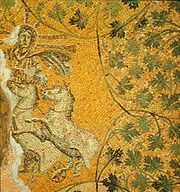- Mōdraniht
-
Mōdraniht (Old English "Night of the Mothers" or "Mothers'-night") was an event held at New Years Day by the heathen Angles where a sacrifice was made. The event is attested by the medieval English historian Bede in his 8th century Latin work De temporum ratione. Scholars have proposed connections between the Anglo-Saxon Mōdraniht and celebrations involving the dísir, the idisi, and the Matres and Matrones practiced by other Germanic peoples.
In De temporum ratione, Bede writes that the pagan Anglo-Saxons:
- Original Latin:
- Incipiebant autem annum ab octavo Calendarum Januariarum die, ubi nunc natale Domini celebramus. Et ipsam noctem nunc nobis sacrosanctam, tunc gentili vocabulo Modranicht, id est, matrum noctem appellabant: ob causam et suspicamur ceremoniarum, quas in ea pervigiles agebant.[1]
- Modern English translation:
- [...] began the year on the 8th kalends of January [25 December], when we celebrate the birth of the Lord. That very night, which we hold so sacred, they used to call by the heathen word Modranecht, that is, "mother's night", because (we suspect) of the ceremonies they enacted all that night.[2]
Rudolf Simek says that Mōdraniht "as a Germanic sacrificial festival should be associated with the Matron cult of the West Germanic peoples on the one hand, and to the dísablót and the Disting already known from medieval Scandinavia on the other hand and is chronologically seen as a connecting link between these forms of Germanic cult."[3]
Notes
References
- Giles, John Allen (1843). The Complete Works of the Venerable Bede, in the Original Latin, Collated with the Manuscripts, and Various Print Editions, Accompanied by a New English Translation of the Historical Works, and a Life of the Author. Vol. IV: Scientific Tracts and Appendix. London: Whittaker and Co., Ave Maria Lane.
- Simek, Rudolf (2007) translated by Angela Hall. Dictionary of Northern Mythology. D. S. Brewer. ISBN 0859915131
- Wallis, Faith (Trans.) (1999). Bede: The Reckoning of Time. Liverpool University Press. ISBN 0853236933
Winter solstice and midwinter festivals Africa 
Americas Inti Raymi°: Peru, Bolivia, Ecuador (Inca†) • Jonkonnu°: Caribbean° (African American) • Soyal: US (Zuni, Hopi) • Wayeb': Guatemala° (Maya) • We Tripantu: Chile (Mapuche)Asia Amaterasu†: Japan • Choimus • Deygān, Maidyarem°: (Zoroastrian) • Dōngzhì, Tōji: (East Asian) • Lohri, Pongal, Makar Sankranti°: India(Hindu) • Sanghamitta Day: Sri Lanka (Buddhist) • Şeva Zistanê: (Kurdish) • Yalda: Iran (Persian)Europe Beiwe: (Saami) • Brumalia†: Ancient Greece • Christmas: Roman Empire° (Christian) • Dies Natalis Solis Invicti†: Roman Empire • Deuorius Riuri†: Gaul • Hogmanay°: Scotland • Karachun°: (West Slavs) • Mōdraniht†: Western Germany (Matres and Matrones) • Midvinterblót†: Sweden (Norse) • Montol Festival, Mummer's Day°: Cornwall (Celts) • Saturnalia†: Rome • Wren's Day°: Ireland, Isle of Man, Wales (Celts) • Yule, Jul°: (Germanic) • Ziemassvētki: Baltic (Romuva)† dagger indicates extinction. ° degree symbol indicates changes in date, name or location. ( ) indicate demographicDísir (North Germanic) and Idisi (West Germanic) Dísir Idisi See also Norns · Valkyrie · Fylgja · Matres and Matrones · Sigewif · Elf · Female spirits in Germanic paganismAnglo-Saxon paganism and mythology Gods and divine figures Heroic figures Other beings Locations Sources Origins Society and culture Neopagan revival Anglo-Saxon time Months and
modern equivalentsMōdraniht (New Years) · Æfterra Gēola (January, Yule) · Solmōnath (February) · Hrēthmōnath (March) · Ēosturmōnath (April) · Thrimilicemōnath (May) · Ærra Litha (June) · Æfterra Litha (July) · Wēodmōnath (August) · Halegmōnath aka Hærfestmōnath (September) · Winterfylleth (October) · Blōtmōnath (November) · Ærra Gēola (December, Yule)Week days See also Categories:
Wikimedia Foundation. 2010.
